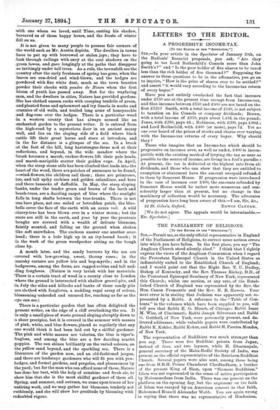LETTERS TO THE EDITOR.
A. PROGRESSIVE INCOME-TAX.
[To THE EDITOR OP TEE " SPECTATOR."] your article in the Spectator of January 20th, on the Radicals' financial proposals, you ask, " Are they- going to tax Lord Rothschild's Consols more than John Smith's ?" and " Is the poor holder of five shares to be taxed less than the rich holder of five thousand P" Supposing the answer to these questions to be in the affirmative, you go on to inquire, " How is the price of shares ever to be settled ?" and assert " it would vary according to the Income-tax return of every buyer."
Have you not entirely overlooked the fact that incomes under £150 are at the present time exempt from Income-tax, and that incomes between £150 and £400 are not taxed on the first £120 ? Smith, with a total income of £149, is not subject- to taxation on his Consols or company dividends; Brown, with a total income of £150, pays about 1.43d. in the pound; Jones, with £280, pays 4d. ; Robinson, with £399, pays 4.89d.; and Lord Rothschild, with £400 (or more), pays 7d. Yet no one ever heard of the prices of stocks and shares ever varying with the Income-tax returns of every buyer. Why should they ?
Those who imagine that an Income-tax which should be progressive on incomes over, as well as under, £400 is incom- patible with the existing method of levying the tax as near as possible to the source of income, are living in a fool's paradise. At present, the tax is deducted at the highest rate from all dividends, and those who can show that they are entitled to exemption or abatement have the amount overpaid refundad to them by Somerset House. If progression were introduced in the case of incomes over £400, the amounts refunded by Somerset House would be rather more numerous and con- siderably larger than at present, but no change in the machinery of collection would be necessary. The advocates of progression have long been aware of this.—I am, Sir, &c.,
[We do not agree. The appeals would be interminable.— ED. Spectator.]


















































 Previous page
Previous page